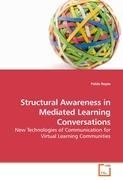This book takes place on the Computer Supported Collaborative Learning domain. In this field, this study aimed to create new technologies of communication for Virtual learning communities (VLCs). Particularly, our research issue is to analyze learning conversations taking place in VLCs in order to provide mechanisms to facilitate the emergence of these interactions among the users of Forum-type tools (FTTs). We have identified in FTTs several anomalies that can discourage the emergence of learning conversations taking place in FTTs: "interactional incongruence", "convergence incongruence", "turn-taking incongruence" and group perception incongruence". We try to improve the FTTs to obtain better environments for group communications. Thus, we propose a peer-to-peer support approach that tries to overcome these incongruencies that we will call the structural awareness approach. It puts emphasis on revealing the structural properties of a group to its members in order to promote better collaborative interactions. This support has been implemented on a FTT called Mailgroup. Mailgroup has been tested in different contexts, obtaining initial feedback of its pertinence. Это и многое другое вы найдете в книге Structural Awareness in Mediated Learning Conversations (Pablo Reyes)
Structural Awareness in Mediated Learning Conversations Pablo Reyes
Подробная информация о книге «Structural Awareness in Mediated Learning Conversations Pablo Reyes». Сайт не предоставляет возможности читать онлайн или скачать бесплатно книгу «Structural Awareness in Mediated Learning Conversations Pablo Reyes»
